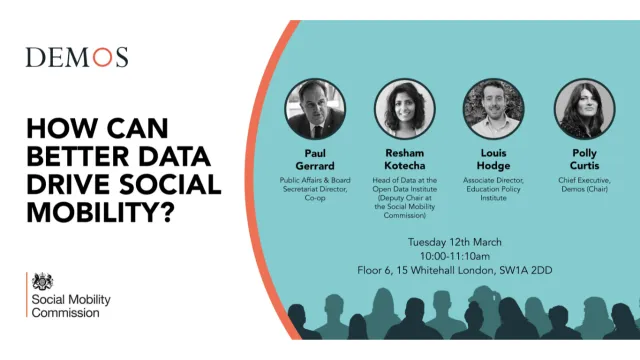Our panel was chaired by Polly Curtis, Chief Executive of DEMOS, and featured Resham Kotecha (Deputy Chair, Social Mobility Commission), Paul Gerrard (Public Affairs and Board Secretariat Director, Co-op) and Louis Hodge (Associate Director, Education Policy Institute).
Discussions focused on:
- How does improving data collection improve social mobility outcomes?
- How do we address the current barriers to finding and using socio-economic data to benefit future policymaking?
- What part does data play in understanding regional inequalities for social mobility?
You can watch the full recording below, or read on for our key takeaways.
Each panellist brought a unique perspective, collectively underscoring the multifaceted challenges and potential of leveraging data for social mobility. With her extensive background in policy and advocacy for social mobility, SMC Deputy Chair, Resham Kotecha, highlighted the pressing need for comprehensive data sets that reflect the nuanced realities of diverse populations.
Resham said:
“It’s about how we can bring together a view on social mobility that is more cohesive and longer term so that we can have a policy structure for 20 years that means future generations will have the best chance of succeeding regardless of where they’re born.”
Paul Gerrard, Co-op, discussed the importance of employers understanding their employees’ socio-economic backgrounds to foster inclusivity and mobility within the workforce. Meanwhile, Louis Hodge, EPI, emphasised the educational sector’s role, pinpointing early educational disparities as a significant factor in lifelong social mobility.
The panel delved into the critical areas where data can influence social mobility, some key points our panel raised:
- Identifying and bridging data gaps: Acknowledging the significant voids in current social mobility analytics, the speakers advocated for more granular, longitudinal studies to understand the life cycle impacts on Social Mobility.
- Improving data sharing and integration: The necessity of seamless data sharing between government departments and local authorities was highlighted as a pathway to formulating more targeted and effective policies.
- Fostering data literacy: There was a consensus on enhancing data literacy among policymakers and the public to ensure that data-driven decision-making becomes the norm rather than the exception.
- Employer engagement: Paul Gerrard shared insights into how the Co-op and other businesses utilise socio-economic data to address internal mobility challenges and create more equitable opportunities.
- Privacy and ethical considerations: The balance between comprehensive data collection and privacy rights was a recurring theme, emphasising the need for ethical guidelines and safeguards in data handling.
In her closing remarks, SMC Deputy Chair, Resham Kotecha said:
“We’ve talked a lot about data consistency and inconsistency. We also need to talk about policy consistency and inconsistency because if we have people whose issues are being tackled differently in different regions, we’ll inevitably have different outcomes. What gets measured gets done.”
There’s a clear call to action for a coordinated approach to enhancing data collection and analysis to inform social mobility policies. The insights gained from the panel echo the need for a dedicated effort from all societal sectors to harness the power of data to create a more equitable society.
On Tuesday 21st May, we’ll hold the third in this series of panel events. This time we’ll be partnering with Policy Connect to explore how to close the gap between graduate and non-graduate routes, and you can find out more on our website.
Find out more about:
State of the Nation 2023: People and Places
